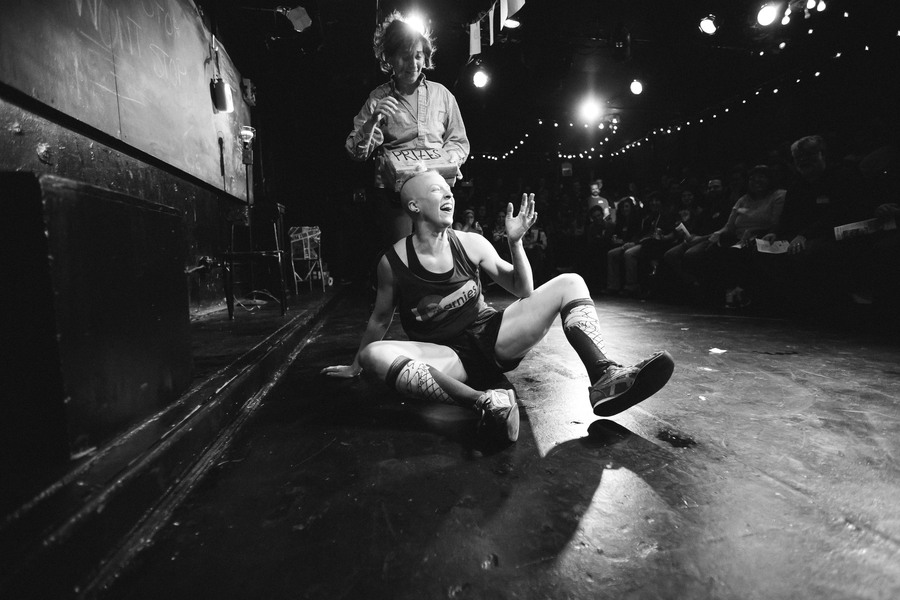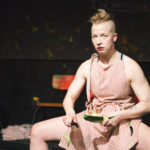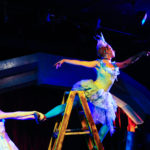As Chicago theatres battened down the hatches against COVID-19, and performers retired to bed earlier than they had in decades, Leah Urzendowski turned her living room into a stage and her frustration into laughter.
The veteran of Chicago’s Neo-Futurists theatre company threw wide the doors of her costume closet and donned over-stretched spandex and sequined tutus to continue creating art. With a platinum Mohawk, dark red lips, and penchant for the word “rad,” Urzendowski hasn’t let sheltering in place keep her from physical theatre, movement, or joy. Anything within reach or within sight can become a play.
This is true to her company’s ethos. Inspired by 20th-century Italian Futurism, the Neo-Futurists’ mission is to bring real experiences to the audience in an interactive, irreproducible way. The ensemble produces a menu of 30 plays in 60 minutes in a performance called The Infinite Wrench. The late-night show has a rotating cast and runs for 50 weeks a year.
“The tenets of Neo-Futurism itself are honesty, brevity, and transformation in the audience,” Urzendowski said. “So we don’t play characters onstage. We don’t tell lies. We are who we are. We are where we are.”
Now the setting of these two-minute plays has expanded beyond the company’s black box theatre to kitchens and backyards and hallways for its digital incarnation, The Infinite Wrench Goes Viral. Audience members can subscribe through Patreon, paying as little as $3 for a weekly recorded video of the plays, which range from comedic to emotional to political and everything in between.
“We call ourselves a living newspaper because we are writing constantly in the moment,” Urzendowski said. Working from home and exploring the augmented realities of video has increased rather than confined her creative space, helping to prompt new material for the Neo-Futurists, who have created well over 11,000 original plays since 1988.
“I can look at my bookshelf and cobble together seven different words,” Urzendowski said, running through the process of creating a two-minute play. “Then I’m going to have the bubble machine going. And now I’m going to have a dog barking in the background. And the title of that play is going to be Bookshelf, Bubble, Dog Bark.”
Writing a play on the spot is the logical progression of an artistic process she has been developing since childhood. Raised in Omaha, Neb., Urzendowksi grew up teaching after-school musical theatre classes to help pay for dance lessons. At 18, she packed up and drove east to attend the Chicago College of Performing Arts at Roosevelt University, where she developed a passion for physical theatre and clown over more traditional alternatives. In 2011, she joined the ensemble of the Neo-Futurists, participating for five years in its long-running show Too Much Light Makes the Baby Go Blind, which was created by the Neo-Futurists’ founder Greg Allen. In 2016, Allen pulled the company’s right to the title, forcing the group to rebrand under the direction of then-artistic director Kurt Chiang. Two years later, Urzendowski and the Neo-Futurists began work on The Infinite Wrench, where she regularly performed until the pandemic halted face-to-face collaboration.
“But all artists have their way of dealing with the world,” Urzendowski said. “We’ll likely use some form of art to cope or to understand what’s happening.”
Urzendowski copes through sharing. She and her husband, Neo-Futurists artistic associate Anthony Courser, have been making videos for their friends and family, dancing in capes and sending them out with little encouraging messages. They’ve also been “Oregon trailing,” as she calls it: trading bread for toilet paper, potting soil for Easter egg dye with her friends and neighbors.
Sharing videos and essentials has temporarily taken the place of sharing knowledge. Urzendowski taught physical theatre and clowning for the Neo-Futurists before classes were suspended in March; her curriculum for the summer and fall has also been cancelled.
“Teaching or choreographing or doing movement direction for a show is where I feel the most selfless in a creative space,” she said. “It’s where I feel like I’m really working for the people in the room and I’m really outside of my own self.”
Urzendowski said she looks forward to returning to teaching as soon as classes are able to resume safely, both physically and emotionally. “Clown (as an art) asks the artist to access a place of vulnerability to really bring truth to the stage,” she said. “As a people, we are existing in an extremely vulnerable state all the time right now. To push that in the classroom seems unhealthy as an educator.”
Her other notable works include Burning Bluebeard, a recurring holiday show based on the 1903 Iroquois Theatre fire, produced by the theatre company the Ruffians. In the production, Urzendowski plays 13-year-old aerialist Nellie Reed, performing an intricate flying routine on a stepladder. The show’s costume designer, Lizzie Bracken, recalled a rehearsal during which Urzendowski practiced the routine on top of a stage door in place of the stepladder. “She’s just a little bit braver than I feel comfortable with,” Bracken said.
Urzendowski also recently co-created and performed The? Unicorn? Hour? with Courser, a segment of which was performed on the Gong Show reboot with Mike Myers. The? Unicorn? Hour? is a sparkling, white-spandexed production about lifting one’s spirit from the unicorn within, with a vibe that Urzendowski described as “Pee-wee’s Playhouse meets Mister Rogers’ Neighborhood.”
And these days, everyone’s spirit could use a little lifting. As the stay-at-home order drags into its 10th week in Chicago, Urzendowski isn’t giving up on creating art that makes her happy and hopes that other artists will continue to do so as well.
“There are people out there that can write beautiful words about tragedy,” she said, “but there’s just as much of a need for joy seekers and radical acts of joy and love.”
Kate Mazade is a Goldring Arts Journalism graduate student at Syracuse University.







